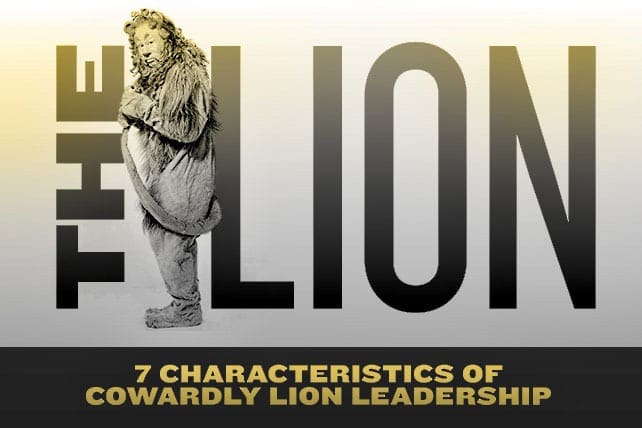7 Characteristics of Cowardly Lion Leadership

“Let’s face it. Leading others is hard. There is often loneliness to leadership.”
You remember the cowardly lion from The Wizard of Oz, don’t you? He was supposed to be the king of the jungle, but he had no courage.
I’ve known some leaders like the cowardly lion. If I’m completely transparent—at times it’s been me.
Let’s face it. Leading others is hard. There is often loneliness to leadership. Leadership takes great courage.
You have no doubt encountered cowardly leaders. Perhaps would even admit you’ve been one too.
Avoids conflict. In every relationship there will be conflict. It is necessary for the strength of relationships and the organization. When the leader avoids conflict, the entire organization avoids it. Hidden or ignored problems are never addressed.
Never willing to make the hard decisions. This is what leaders do. Leaders don’t have to be the smartest person in the room. They don’t even have to be the one with the most experience. Leaders make the decisions no one else is willing to make.
Pretends everything is OK—even when it is not. When everything is amazing, nothing really is. Cowardly leaders gloss over the real problems in the organization. They refuse to address them either because they fear they don’t know how or their pride gets in the way.
Bails on the team when things become difficult. I’ll have to admit this has been me. I’ve written about it before, but when I was in business, and things were difficult, it was easier to disappear than face the issues. The learning experience was that once I checked-out or when I was disappearing, so was my team. Great leaders are on the frontline during the most difficult days, leading everyone through the storm.
Refuses to back up team members. No one wants to serve someone who will not protect them or have their back. People need to know if they make mistakes there is a leader who still supports them and can help them do better the next time.
Caves in to criticism. Make any decision and a leader will receive criticism. Even if it is unfounded, cowardly leaders fall apart when people complain. They take it personally and refuse to see any value in it. These leaders see every criticism as a threat against their leadership rather than another way to learn and grow.
What would you add to my list?
Let’s be leaders of courage. In fact, I believe courage should be in our definition of leadership.
Do you find it scary to be a leader sometimes? What’s the scariest time you face as a leader?
I’ve known some leaders like the cowardly lion. If I’m completely transparent—at times it’s been me.
Let’s face it. Leading others is hard. There is often loneliness to leadership. Leadership takes great courage.
You have no doubt encountered cowardly leaders. Perhaps would even admit you’ve been one too.
Here are seven characteristics of cowardly leadership:
Say what people want to hear. They might say, for example, “I’ll think about it,” rather than “No”—even if no is already the decided answer. I get it. It’s easier. But the ease is only temporary. These leaders are notorious for saying one thing to one person and another to someone else. They want everyone to like them.Avoids conflict. In every relationship there will be conflict. It is necessary for the strength of relationships and the organization. When the leader avoids conflict, the entire organization avoids it. Hidden or ignored problems are never addressed.
Never willing to make the hard decisions. This is what leaders do. Leaders don’t have to be the smartest person in the room. They don’t even have to be the one with the most experience. Leaders make the decisions no one else is willing to make.
Pretends everything is OK—even when it is not. When everything is amazing, nothing really is. Cowardly leaders gloss over the real problems in the organization. They refuse to address them either because they fear they don’t know how or their pride gets in the way.
Bails on the team when things become difficult. I’ll have to admit this has been me. I’ve written about it before, but when I was in business, and things were difficult, it was easier to disappear than face the issues. The learning experience was that once I checked-out or when I was disappearing, so was my team. Great leaders are on the frontline during the most difficult days, leading everyone through the storm.
Refuses to back up team members. No one wants to serve someone who will not protect them or have their back. People need to know if they make mistakes there is a leader who still supports them and can help them do better the next time.
Caves in to criticism. Make any decision and a leader will receive criticism. Even if it is unfounded, cowardly leaders fall apart when people complain. They take it personally and refuse to see any value in it. These leaders see every criticism as a threat against their leadership rather than another way to learn and grow.
What would you add to my list?
Let’s be leaders of courage. In fact, I believe courage should be in our definition of leadership.
Do you find it scary to be a leader sometimes? What’s the scariest time you face as a leader?

No comments:
Post a Comment